Comprehensive Strategic Analysis of Starbucks: A Business Report
VerifiedAdded on 2020/03/23
|22
|4596
|962
Report
AI Summary
This report offers a comprehensive strategic analysis of Starbucks Corporation, examining its business strategies and competitive landscape. It begins with an executive summary and introduction, followed by an in-depth analysis using the Ansoff matrix, exploring market penetration, product development, market development, and diversification strategies. A PESTEL analysis evaluates the political, economic, social, technological, environmental, and legal factors impacting Starbucks. The Porter's Five Forces model assesses competitive rivalry, the threat of substitution, and the bargaining power of buyers and suppliers. The report also includes an analysis of Starbucks' life cycle, value chain, and a SWOT analysis to identify the company's strengths, weaknesses, opportunities, and threats. Finally, recommendations are provided, suggesting strategies such as limiting store openings through licensing and increasing product value to mitigate risks in different geographical markets. The analysis aims to enhance the understanding of strategies used in the organization and identify the various advantages, resources and capabilities Starbucks possesses to compete with its competitors.
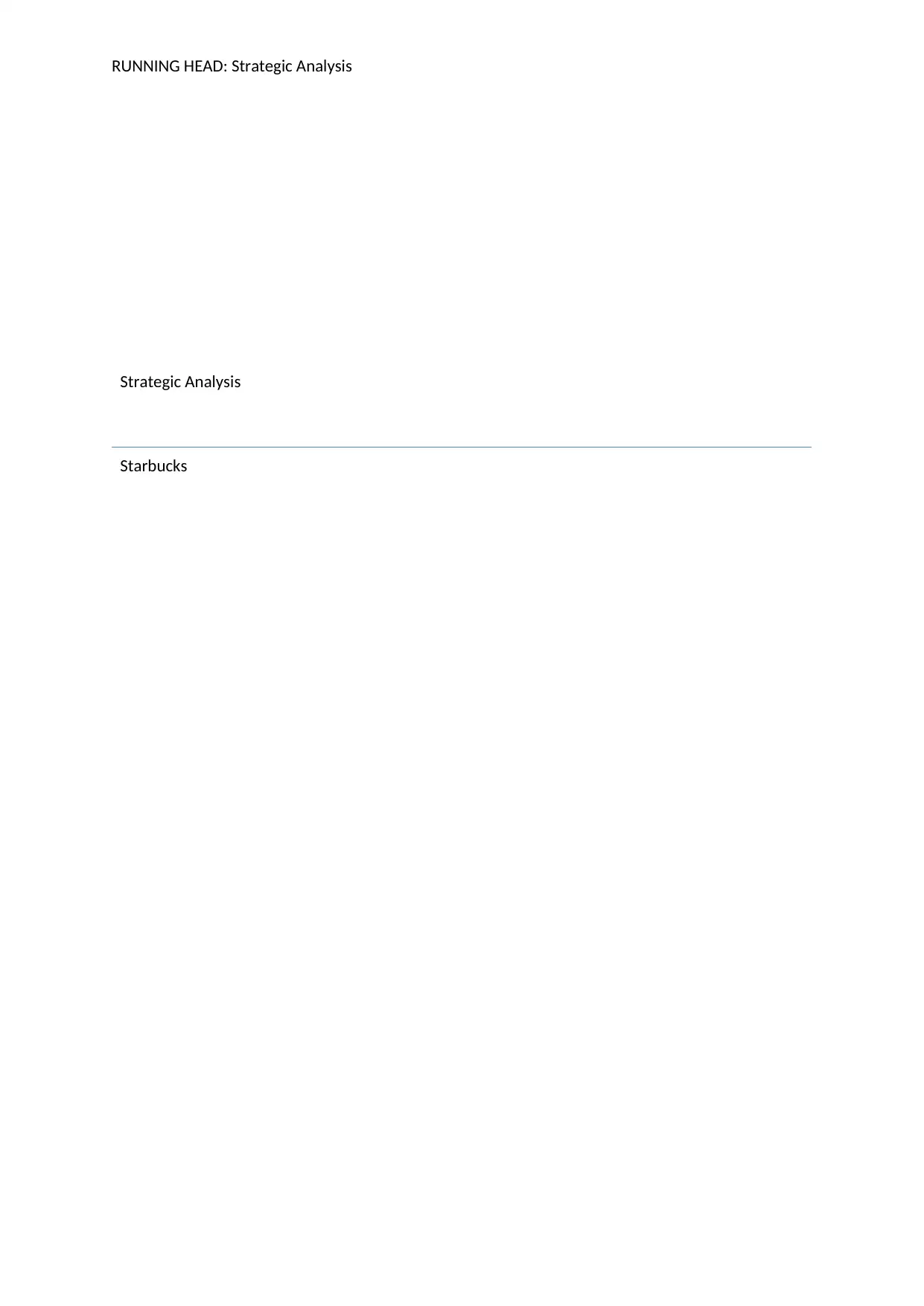
RUNNING HEAD: Strategic Analysis
Strategic Analysis
Starbucks
Strategic Analysis
Starbucks
Paraphrase This Document
Need a fresh take? Get an instant paraphrase of this document with our AI Paraphraser
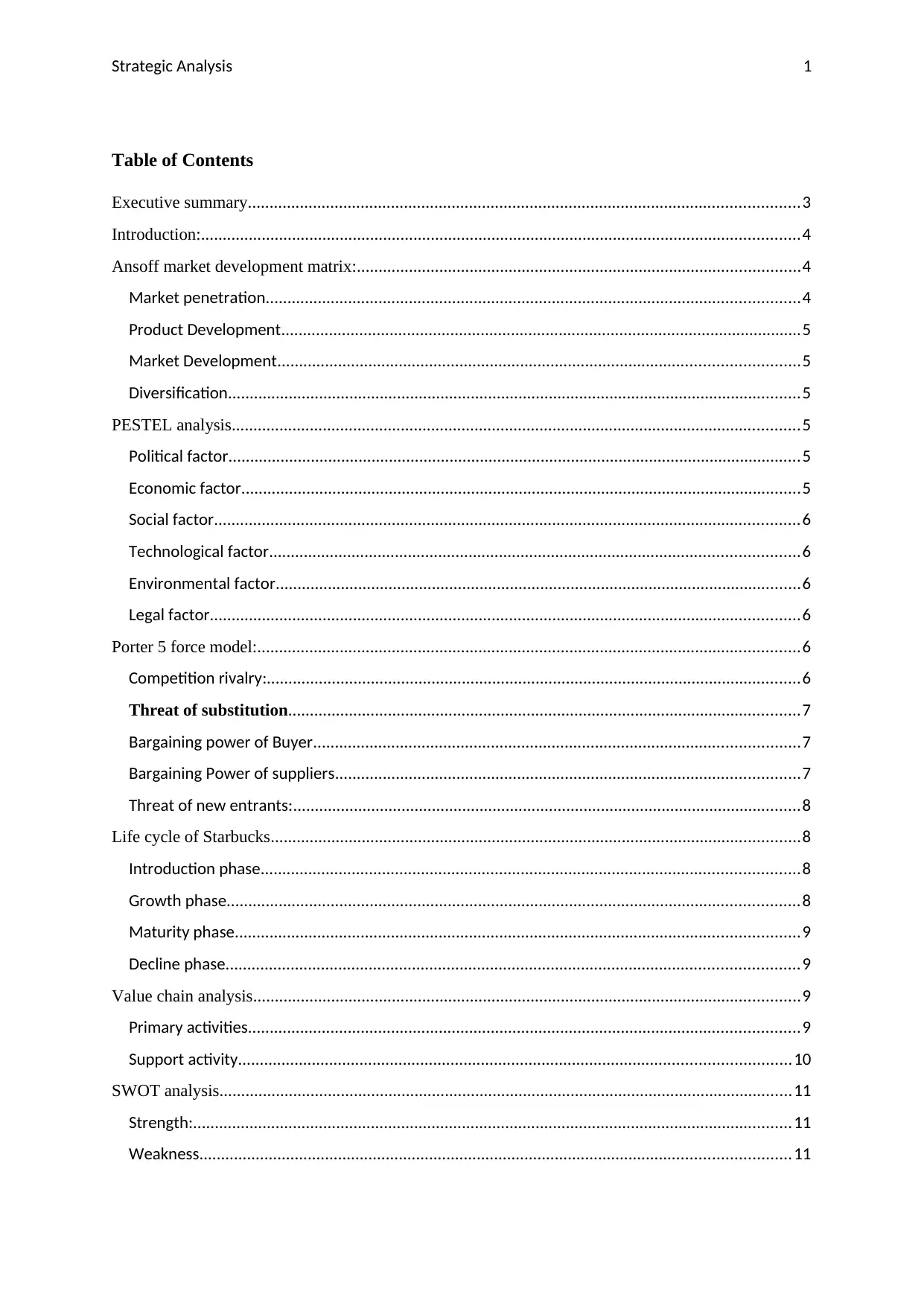
Strategic Analysis 1
Table of Contents
Executive summary...............................................................................................................................3
Introduction:..........................................................................................................................................4
Ansoff market development matrix:......................................................................................................4
Market penetration...........................................................................................................................4
Product Development........................................................................................................................5
Market Development........................................................................................................................5
Diversification....................................................................................................................................5
PESTEL analysis...................................................................................................................................5
Political factor....................................................................................................................................5
Economic factor.................................................................................................................................5
Social factor.......................................................................................................................................6
Technological factor..........................................................................................................................6
Environmental factor.........................................................................................................................6
Legal factor........................................................................................................................................6
Porter 5 force model:.............................................................................................................................6
Competition rivalry:...........................................................................................................................6
Threat of substitution......................................................................................................................7
Bargaining power of Buyer................................................................................................................7
Bargaining Power of suppliers...........................................................................................................7
Threat of new entrants:.....................................................................................................................8
Life cycle of Starbucks..........................................................................................................................8
Introduction phase............................................................................................................................8
Growth phase....................................................................................................................................8
Maturity phase..................................................................................................................................9
Decline phase....................................................................................................................................9
Value chain analysis..............................................................................................................................9
Primary activities...............................................................................................................................9
Support activity...............................................................................................................................10
SWOT analysis....................................................................................................................................11
Strength:..........................................................................................................................................11
Weakness........................................................................................................................................11
Table of Contents
Executive summary...............................................................................................................................3
Introduction:..........................................................................................................................................4
Ansoff market development matrix:......................................................................................................4
Market penetration...........................................................................................................................4
Product Development........................................................................................................................5
Market Development........................................................................................................................5
Diversification....................................................................................................................................5
PESTEL analysis...................................................................................................................................5
Political factor....................................................................................................................................5
Economic factor.................................................................................................................................5
Social factor.......................................................................................................................................6
Technological factor..........................................................................................................................6
Environmental factor.........................................................................................................................6
Legal factor........................................................................................................................................6
Porter 5 force model:.............................................................................................................................6
Competition rivalry:...........................................................................................................................6
Threat of substitution......................................................................................................................7
Bargaining power of Buyer................................................................................................................7
Bargaining Power of suppliers...........................................................................................................7
Threat of new entrants:.....................................................................................................................8
Life cycle of Starbucks..........................................................................................................................8
Introduction phase............................................................................................................................8
Growth phase....................................................................................................................................8
Maturity phase..................................................................................................................................9
Decline phase....................................................................................................................................9
Value chain analysis..............................................................................................................................9
Primary activities...............................................................................................................................9
Support activity...............................................................................................................................10
SWOT analysis....................................................................................................................................11
Strength:..........................................................................................................................................11
Weakness........................................................................................................................................11
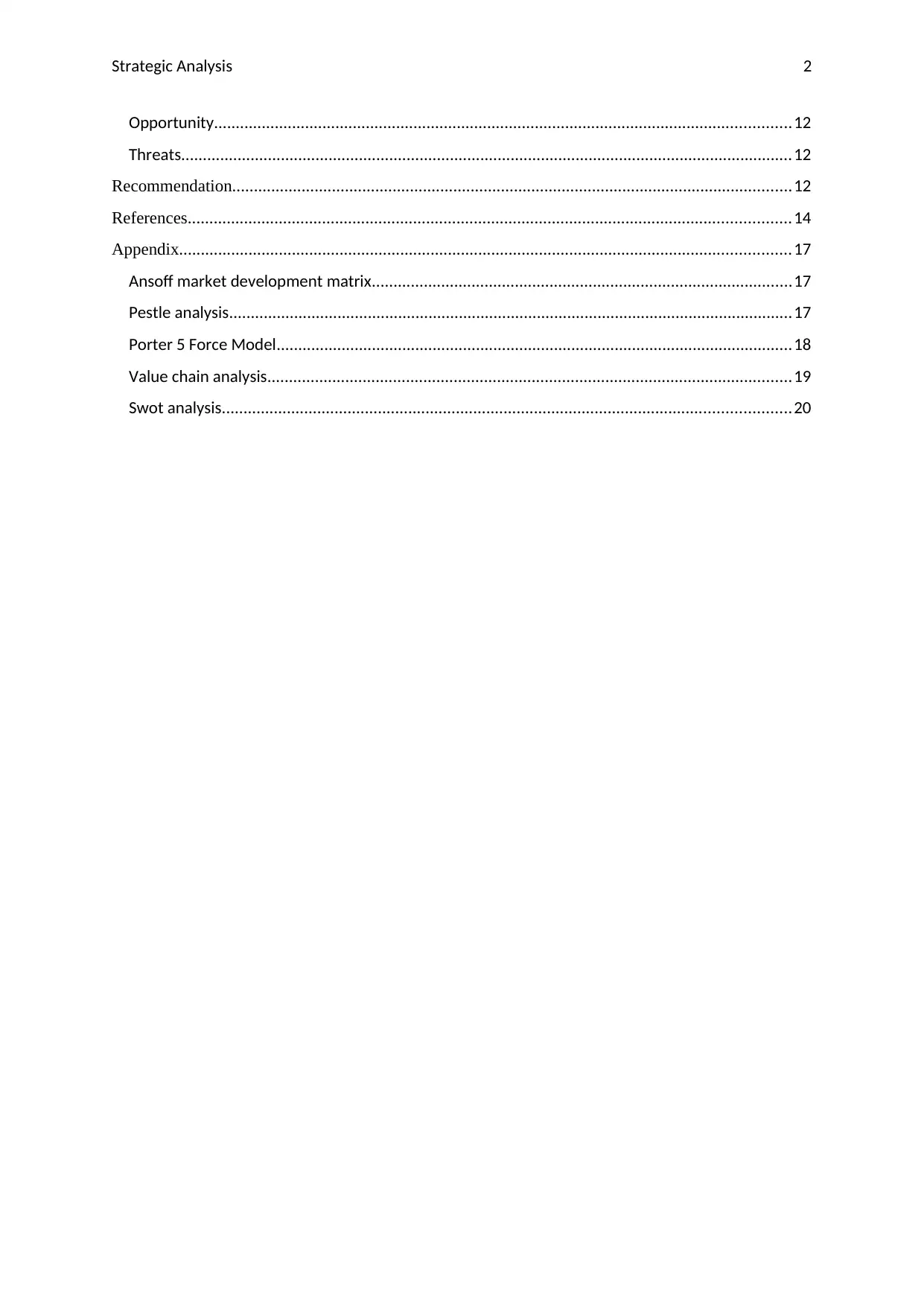
Strategic Analysis 2
Opportunity.....................................................................................................................................12
Threats.............................................................................................................................................12
Recommendation.................................................................................................................................12
References...........................................................................................................................................14
Appendix.............................................................................................................................................17
Ansoff market development matrix.................................................................................................17
Pestle analysis..................................................................................................................................17
Porter 5 Force Model.......................................................................................................................18
Value chain analysis.........................................................................................................................19
Swot analysis...................................................................................................................................20
Opportunity.....................................................................................................................................12
Threats.............................................................................................................................................12
Recommendation.................................................................................................................................12
References...........................................................................................................................................14
Appendix.............................................................................................................................................17
Ansoff market development matrix.................................................................................................17
Pestle analysis..................................................................................................................................17
Porter 5 Force Model.......................................................................................................................18
Value chain analysis.........................................................................................................................19
Swot analysis...................................................................................................................................20
⊘ This is a preview!⊘
Do you want full access?
Subscribe today to unlock all pages.

Trusted by 1+ million students worldwide
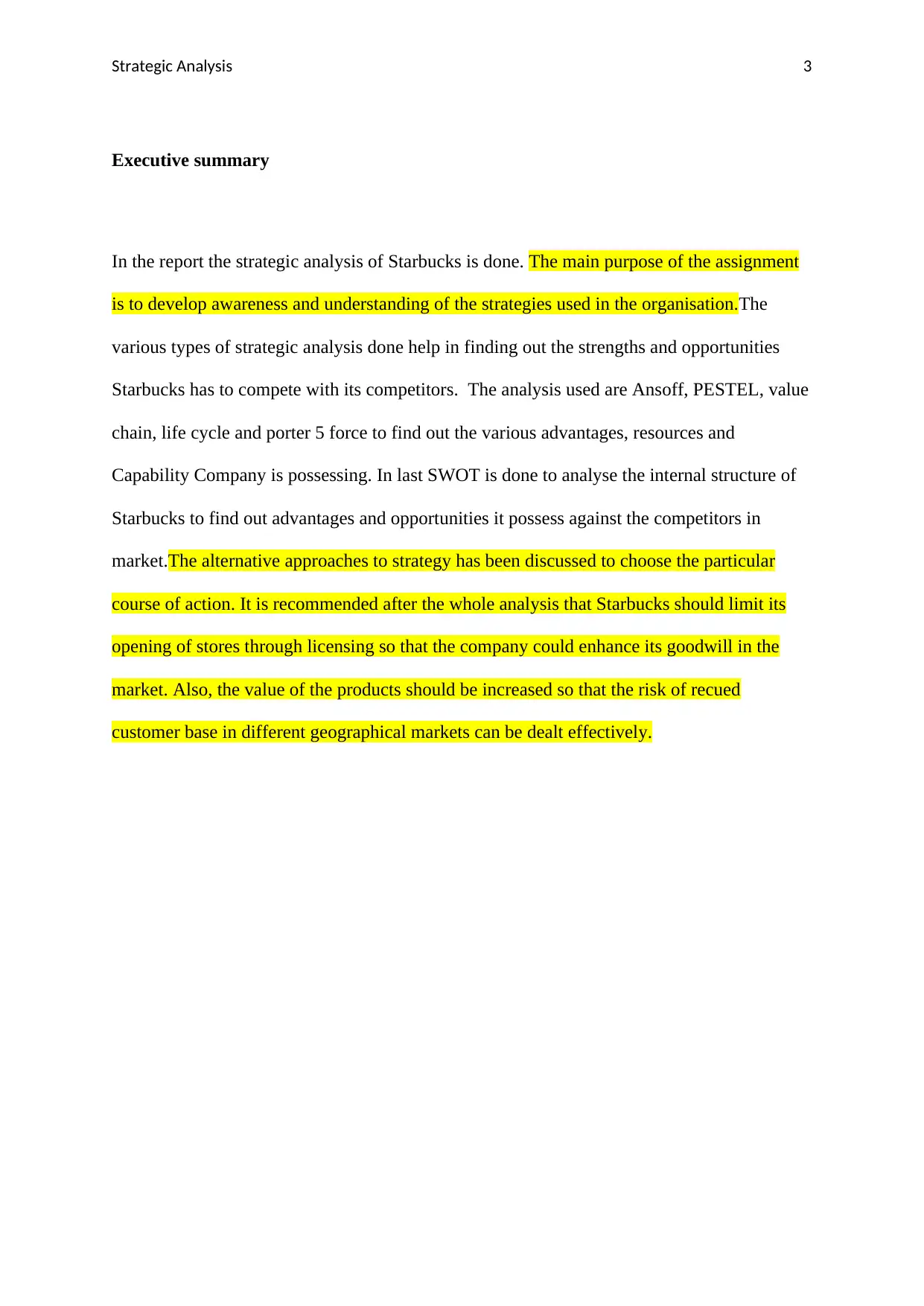
Strategic Analysis 3
Executive summary
In the report the strategic analysis of Starbucks is done. The main purpose of the assignment
is to develop awareness and understanding of the strategies used in the organisation.The
various types of strategic analysis done help in finding out the strengths and opportunities
Starbucks has to compete with its competitors. The analysis used are Ansoff, PESTEL, value
chain, life cycle and porter 5 force to find out the various advantages, resources and
Capability Company is possessing. In last SWOT is done to analyse the internal structure of
Starbucks to find out advantages and opportunities it possess against the competitors in
market.The alternative approaches to strategy has been discussed to choose the particular
course of action. It is recommended after the whole analysis that Starbucks should limit its
opening of stores through licensing so that the company could enhance its goodwill in the
market. Also, the value of the products should be increased so that the risk of recued
customer base in different geographical markets can be dealt effectively.
Executive summary
In the report the strategic analysis of Starbucks is done. The main purpose of the assignment
is to develop awareness and understanding of the strategies used in the organisation.The
various types of strategic analysis done help in finding out the strengths and opportunities
Starbucks has to compete with its competitors. The analysis used are Ansoff, PESTEL, value
chain, life cycle and porter 5 force to find out the various advantages, resources and
Capability Company is possessing. In last SWOT is done to analyse the internal structure of
Starbucks to find out advantages and opportunities it possess against the competitors in
market.The alternative approaches to strategy has been discussed to choose the particular
course of action. It is recommended after the whole analysis that Starbucks should limit its
opening of stores through licensing so that the company could enhance its goodwill in the
market. Also, the value of the products should be increased so that the risk of recued
customer base in different geographical markets can be dealt effectively.
Paraphrase This Document
Need a fresh take? Get an instant paraphrase of this document with our AI Paraphraser
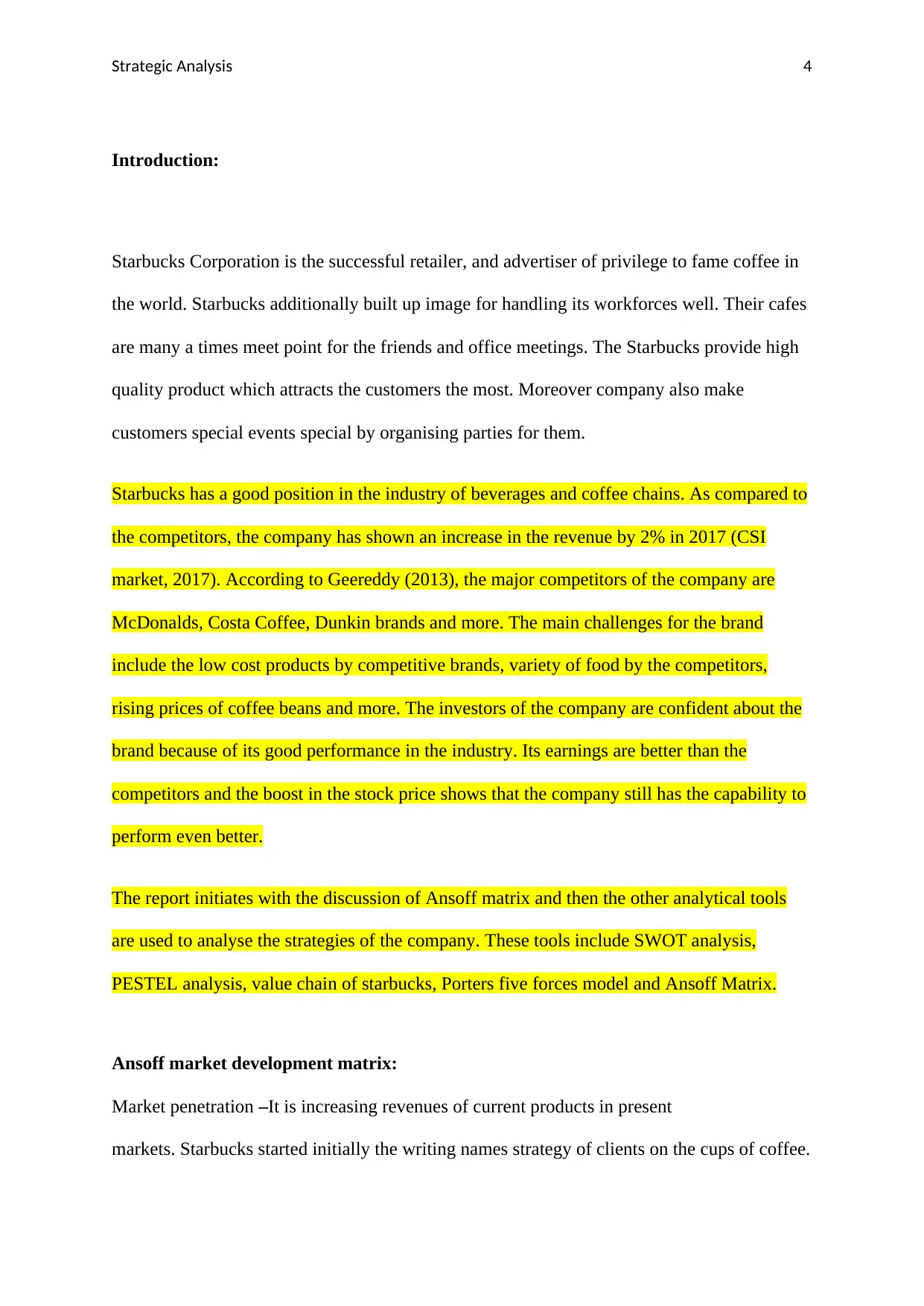
Strategic Analysis 4
Introduction:
Starbucks Corporation is the successful retailer, and advertiser of privilege to fame coffee in
the world. Starbucks additionally built up image for handling its workforces well. Their cafes
are many a times meet point for the friends and office meetings. The Starbucks provide high
quality product which attracts the customers the most. Moreover company also make
customers special events special by organising parties for them.
Starbucks has a good position in the industry of beverages and coffee chains. As compared to
the competitors, the company has shown an increase in the revenue by 2% in 2017 (CSI
market, 2017). According to Geereddy (2013), the major competitors of the company are
McDonalds, Costa Coffee, Dunkin brands and more. The main challenges for the brand
include the low cost products by competitive brands, variety of food by the competitors,
rising prices of coffee beans and more. The investors of the company are confident about the
brand because of its good performance in the industry. Its earnings are better than the
competitors and the boost in the stock price shows that the company still has the capability to
perform even better.
The report initiates with the discussion of Ansoff matrix and then the other analytical tools
are used to analyse the strategies of the company. These tools include SWOT analysis,
PESTEL analysis, value chain of starbucks, Porters five forces model and Ansoff Matrix.
Ansoff market development matrix:
Market penetration –It is increasing revenues of current products in present
markets. Starbucks started initially the writing names strategy of clients on the cups of coffee.
Introduction:
Starbucks Corporation is the successful retailer, and advertiser of privilege to fame coffee in
the world. Starbucks additionally built up image for handling its workforces well. Their cafes
are many a times meet point for the friends and office meetings. The Starbucks provide high
quality product which attracts the customers the most. Moreover company also make
customers special events special by organising parties for them.
Starbucks has a good position in the industry of beverages and coffee chains. As compared to
the competitors, the company has shown an increase in the revenue by 2% in 2017 (CSI
market, 2017). According to Geereddy (2013), the major competitors of the company are
McDonalds, Costa Coffee, Dunkin brands and more. The main challenges for the brand
include the low cost products by competitive brands, variety of food by the competitors,
rising prices of coffee beans and more. The investors of the company are confident about the
brand because of its good performance in the industry. Its earnings are better than the
competitors and the boost in the stock price shows that the company still has the capability to
perform even better.
The report initiates with the discussion of Ansoff matrix and then the other analytical tools
are used to analyse the strategies of the company. These tools include SWOT analysis,
PESTEL analysis, value chain of starbucks, Porters five forces model and Ansoff Matrix.
Ansoff market development matrix:
Market penetration –It is increasing revenues of current products in present
markets. Starbucks started initially the writing names strategy of clients on the cups of coffee.
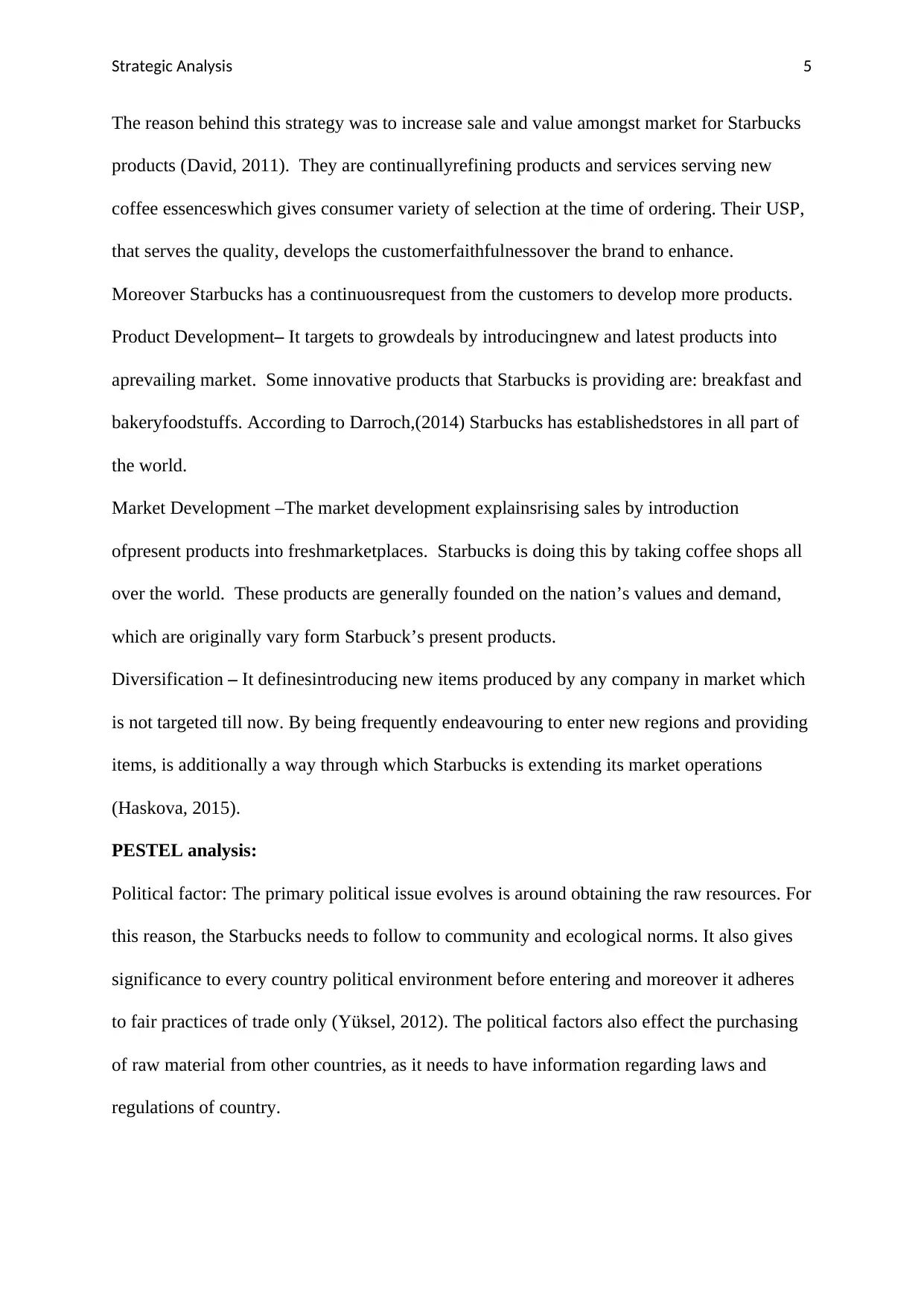
Strategic Analysis 5
The reason behind this strategy was to increase sale and value amongst market for Starbucks
products (David, 2011). They are continuallyrefining products and services serving new
coffee essenceswhich gives consumer variety of selection at the time of ordering. Their USP,
that serves the quality, develops the customerfaithfulnessover the brand to enhance.
Moreover Starbucks has a continuousrequest from the customers to develop more products.
Product Development– It targets to growdeals by introducingnew and latest products into
aprevailing market. Some innovative products that Starbucks is providing are: breakfast and
bakeryfoodstuffs. According to Darroch,(2014) Starbucks has establishedstores in all part of
the world.
Market Development –The market development explainsrising sales by introduction
ofpresent products into freshmarketplaces. Starbucks is doing this by taking coffee shops all
over the world. These products are generally founded on the nation’s values and demand,
which are originally vary form Starbuck’s present products.
Diversification – It definesintroducing new items produced by any company in market which
is not targeted till now. By being frequently endeavouring to enter new regions and providing
items, is additionally a way through which Starbucks is extending its market operations
(Haskova, 2015).
PESTEL analysis:
Political factor: The primary political issue evolves is around obtaining the raw resources. For
this reason, the Starbucks needs to follow to community and ecological norms. It also gives
significance to every country political environment before entering and moreover it adheres
to fair practices of trade only (Yüksel, 2012). The political factors also effect the purchasing
of raw material from other countries, as it needs to have information regarding laws and
regulations of country.
The reason behind this strategy was to increase sale and value amongst market for Starbucks
products (David, 2011). They are continuallyrefining products and services serving new
coffee essenceswhich gives consumer variety of selection at the time of ordering. Their USP,
that serves the quality, develops the customerfaithfulnessover the brand to enhance.
Moreover Starbucks has a continuousrequest from the customers to develop more products.
Product Development– It targets to growdeals by introducingnew and latest products into
aprevailing market. Some innovative products that Starbucks is providing are: breakfast and
bakeryfoodstuffs. According to Darroch,(2014) Starbucks has establishedstores in all part of
the world.
Market Development –The market development explainsrising sales by introduction
ofpresent products into freshmarketplaces. Starbucks is doing this by taking coffee shops all
over the world. These products are generally founded on the nation’s values and demand,
which are originally vary form Starbuck’s present products.
Diversification – It definesintroducing new items produced by any company in market which
is not targeted till now. By being frequently endeavouring to enter new regions and providing
items, is additionally a way through which Starbucks is extending its market operations
(Haskova, 2015).
PESTEL analysis:
Political factor: The primary political issue evolves is around obtaining the raw resources. For
this reason, the Starbucks needs to follow to community and ecological norms. It also gives
significance to every country political environment before entering and moreover it adheres
to fair practices of trade only (Yüksel, 2012). The political factors also effect the purchasing
of raw material from other countries, as it needs to have information regarding laws and
regulations of country.
⊘ This is a preview!⊘
Do you want full access?
Subscribe today to unlock all pages.

Trusted by 1+ million students worldwide
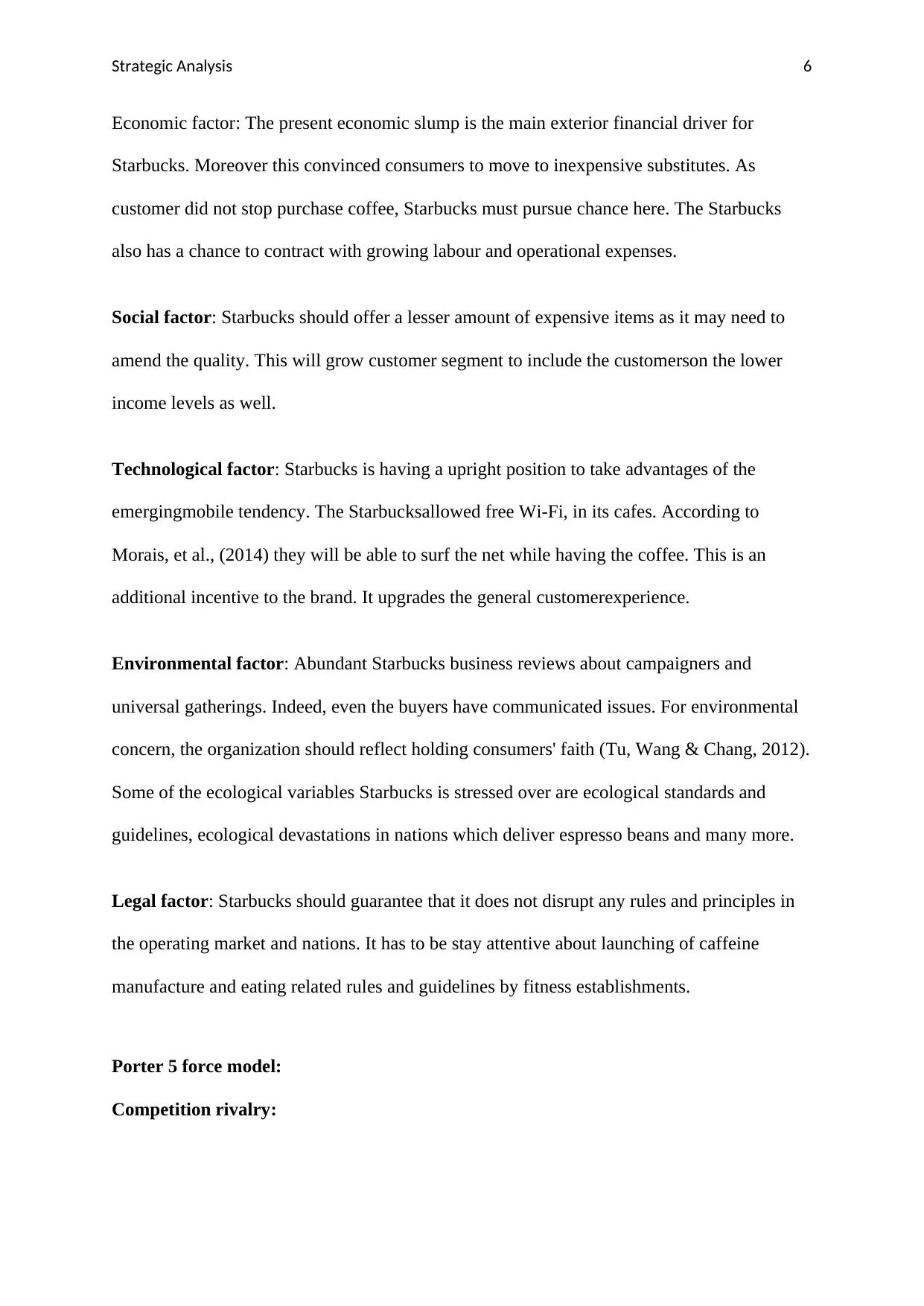
Strategic Analysis 6
Economic factor: The present economic slump is the main exterior financial driver for
Starbucks. Moreover this convinced consumers to move to inexpensive substitutes. As
customer did not stop purchase coffee, Starbucks must pursue chance here. The Starbucks
also has a chance to contract with growing labour and operational expenses.
Social factor: Starbucks should offer a lesser amount of expensive items as it may need to
amend the quality. This will grow customer segment to include the customerson the lower
income levels as well.
Technological factor: Starbucks is having a upright position to take advantages of the
emergingmobile tendency. The Starbucksallowed free Wi-Fi, in its cafes. According to
Morais, et al., (2014) they will be able to surf the net while having the coffee. This is an
additional incentive to the brand. It upgrades the general customerexperience.
Environmental factor: Abundant Starbucks business reviews about campaigners and
universal gatherings. Indeed, even the buyers have communicated issues. For environmental
concern, the organization should reflect holding consumers' faith (Tu, Wang & Chang, 2012).
Some of the ecological variables Starbucks is stressed over are ecological standards and
guidelines, ecological devastations in nations which deliver espresso beans and many more.
Legal factor: Starbucks should guarantee that it does not disrupt any rules and principles in
the operating market and nations. It has to be stay attentive about launching of caffeine
manufacture and eating related rules and guidelines by fitness establishments.
Porter 5 force model:
Competition rivalry:
Economic factor: The present economic slump is the main exterior financial driver for
Starbucks. Moreover this convinced consumers to move to inexpensive substitutes. As
customer did not stop purchase coffee, Starbucks must pursue chance here. The Starbucks
also has a chance to contract with growing labour and operational expenses.
Social factor: Starbucks should offer a lesser amount of expensive items as it may need to
amend the quality. This will grow customer segment to include the customerson the lower
income levels as well.
Technological factor: Starbucks is having a upright position to take advantages of the
emergingmobile tendency. The Starbucksallowed free Wi-Fi, in its cafes. According to
Morais, et al., (2014) they will be able to surf the net while having the coffee. This is an
additional incentive to the brand. It upgrades the general customerexperience.
Environmental factor: Abundant Starbucks business reviews about campaigners and
universal gatherings. Indeed, even the buyers have communicated issues. For environmental
concern, the organization should reflect holding consumers' faith (Tu, Wang & Chang, 2012).
Some of the ecological variables Starbucks is stressed over are ecological standards and
guidelines, ecological devastations in nations which deliver espresso beans and many more.
Legal factor: Starbucks should guarantee that it does not disrupt any rules and principles in
the operating market and nations. It has to be stay attentive about launching of caffeine
manufacture and eating related rules and guidelines by fitness establishments.
Porter 5 force model:
Competition rivalry:
Paraphrase This Document
Need a fresh take? Get an instant paraphrase of this document with our AI Paraphraser
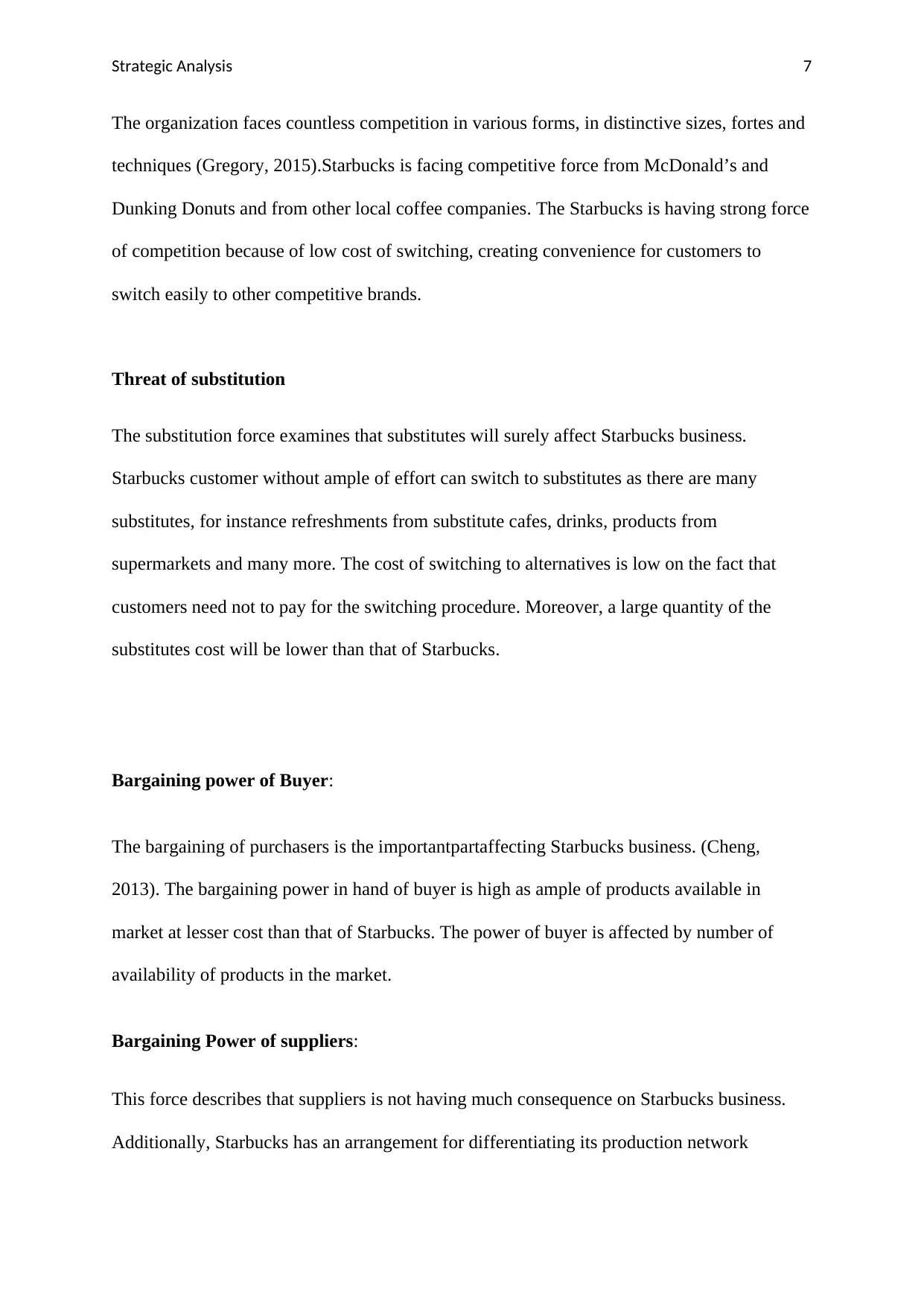
Strategic Analysis 7
The organization faces countless competition in various forms, in distinctive sizes, fortes and
techniques (Gregory, 2015).Starbucks is facing competitive force from McDonald’s and
Dunking Donuts and from other local coffee companies. The Starbucks is having strong force
of competition because of low cost of switching, creating convenience for customers to
switch easily to other competitive brands.
Threat of substitution
The substitution force examines that substitutes will surely affect Starbucks business.
Starbucks customer without ample of effort can switch to substitutes as there are many
substitutes, for instance refreshments from substitute cafes, drinks, products from
supermarkets and many more. The cost of switching to alternatives is low on the fact that
customers need not to pay for the switching procedure. Moreover, a large quantity of the
substitutes cost will be lower than that of Starbucks.
Bargaining power of Buyer:
The bargaining of purchasers is the importantpartaffecting Starbucks business. (Cheng,
2013). The bargaining power in hand of buyer is high as ample of products available in
market at lesser cost than that of Starbucks. The power of buyer is affected by number of
availability of products in the market.
Bargaining Power of suppliers:
This force describes that suppliers is not having much consequence on Starbucks business.
Additionally, Starbucks has an arrangement for differentiating its production network
The organization faces countless competition in various forms, in distinctive sizes, fortes and
techniques (Gregory, 2015).Starbucks is facing competitive force from McDonald’s and
Dunking Donuts and from other local coffee companies. The Starbucks is having strong force
of competition because of low cost of switching, creating convenience for customers to
switch easily to other competitive brands.
Threat of substitution
The substitution force examines that substitutes will surely affect Starbucks business.
Starbucks customer without ample of effort can switch to substitutes as there are many
substitutes, for instance refreshments from substitute cafes, drinks, products from
supermarkets and many more. The cost of switching to alternatives is low on the fact that
customers need not to pay for the switching procedure. Moreover, a large quantity of the
substitutes cost will be lower than that of Starbucks.
Bargaining power of Buyer:
The bargaining of purchasers is the importantpartaffecting Starbucks business. (Cheng,
2013). The bargaining power in hand of buyer is high as ample of products available in
market at lesser cost than that of Starbucks. The power of buyer is affected by number of
availability of products in the market.
Bargaining Power of suppliers:
This force describes that suppliers is not having much consequence on Starbucks business.
Additionally, Starbucks has an arrangement for differentiating its production network
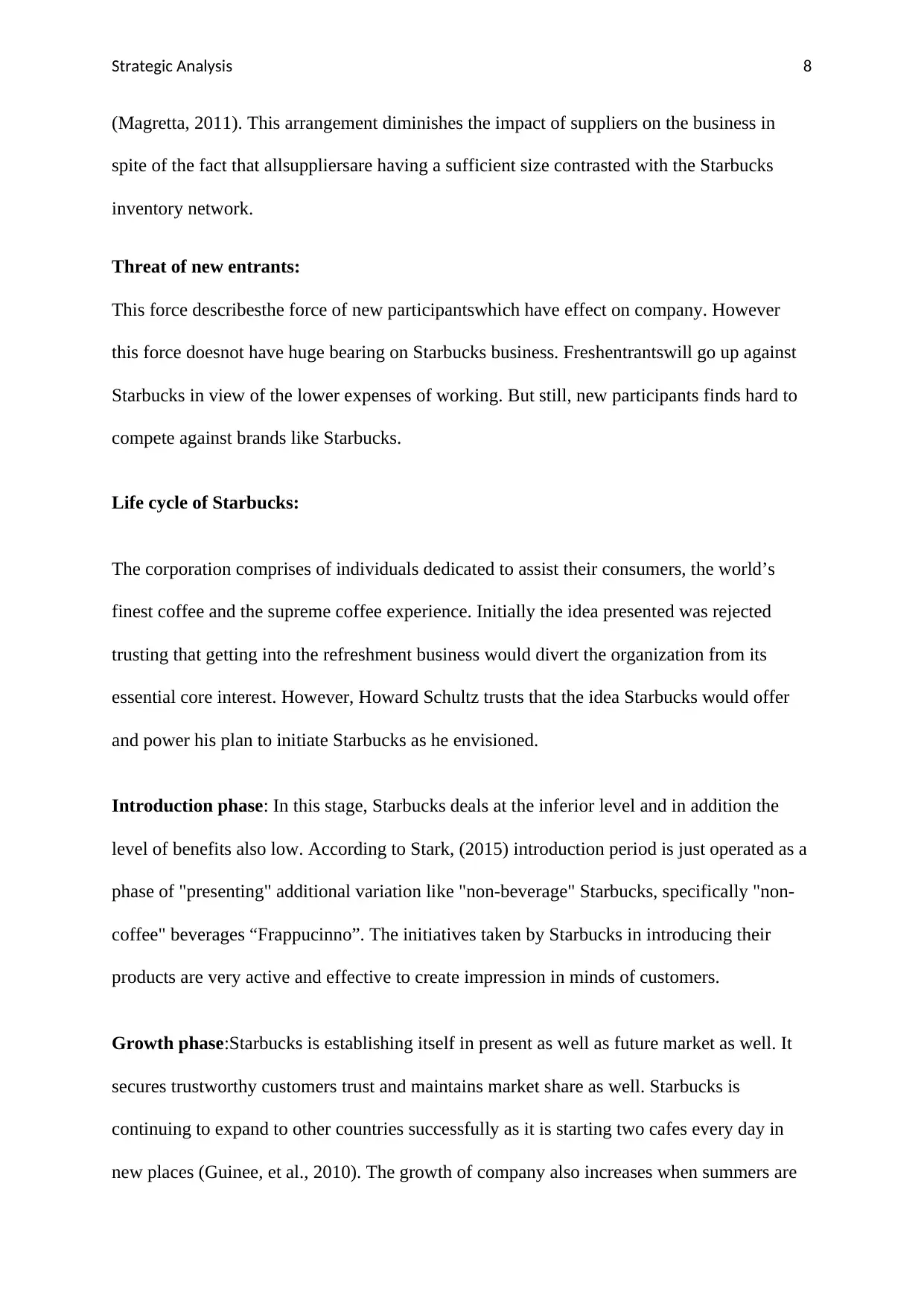
Strategic Analysis 8
(Magretta, 2011). This arrangement diminishes the impact of suppliers on the business in
spite of the fact that allsuppliersare having a sufficient size contrasted with the Starbucks
inventory network.
Threat of new entrants:
This force describesthe force of new participantswhich have effect on company. However
this force doesnot have huge bearing on Starbucks business. Freshentrantswill go up against
Starbucks in view of the lower expenses of working. But still, new participants finds hard to
compete against brands like Starbucks.
Life cycle of Starbucks:
The corporation comprises of individuals dedicated to assist their consumers, the world’s
finest coffee and the supreme coffee experience. Initially the idea presented was rejected
trusting that getting into the refreshment business would divert the organization from its
essential core interest. However, Howard Schultz trusts that the idea Starbucks would offer
and power his plan to initiate Starbucks as he envisioned.
Introduction phase: In this stage, Starbucks deals at the inferior level and in addition the
level of benefits also low. According to Stark, (2015) introduction period is just operated as a
phase of "presenting" additional variation like "non-beverage" Starbucks, specifically "non-
coffee" beverages “Frappucinno”. The initiatives taken by Starbucks in introducing their
products are very active and effective to create impression in minds of customers.
Growth phase:Starbucks is establishing itself in present as well as future market as well. It
secures trustworthy customers trust and maintains market share as well. Starbucks is
continuing to expand to other countries successfully as it is starting two cafes every day in
new places (Guinee, et al., 2010). The growth of company also increases when summers are
(Magretta, 2011). This arrangement diminishes the impact of suppliers on the business in
spite of the fact that allsuppliersare having a sufficient size contrasted with the Starbucks
inventory network.
Threat of new entrants:
This force describesthe force of new participantswhich have effect on company. However
this force doesnot have huge bearing on Starbucks business. Freshentrantswill go up against
Starbucks in view of the lower expenses of working. But still, new participants finds hard to
compete against brands like Starbucks.
Life cycle of Starbucks:
The corporation comprises of individuals dedicated to assist their consumers, the world’s
finest coffee and the supreme coffee experience. Initially the idea presented was rejected
trusting that getting into the refreshment business would divert the organization from its
essential core interest. However, Howard Schultz trusts that the idea Starbucks would offer
and power his plan to initiate Starbucks as he envisioned.
Introduction phase: In this stage, Starbucks deals at the inferior level and in addition the
level of benefits also low. According to Stark, (2015) introduction period is just operated as a
phase of "presenting" additional variation like "non-beverage" Starbucks, specifically "non-
coffee" beverages “Frappucinno”. The initiatives taken by Starbucks in introducing their
products are very active and effective to create impression in minds of customers.
Growth phase:Starbucks is establishing itself in present as well as future market as well. It
secures trustworthy customers trust and maintains market share as well. Starbucks is
continuing to expand to other countries successfully as it is starting two cafes every day in
new places (Guinee, et al., 2010). The growth of company also increases when summers are
⊘ This is a preview!⊘
Do you want full access?
Subscribe today to unlock all pages.

Trusted by 1+ million students worldwide
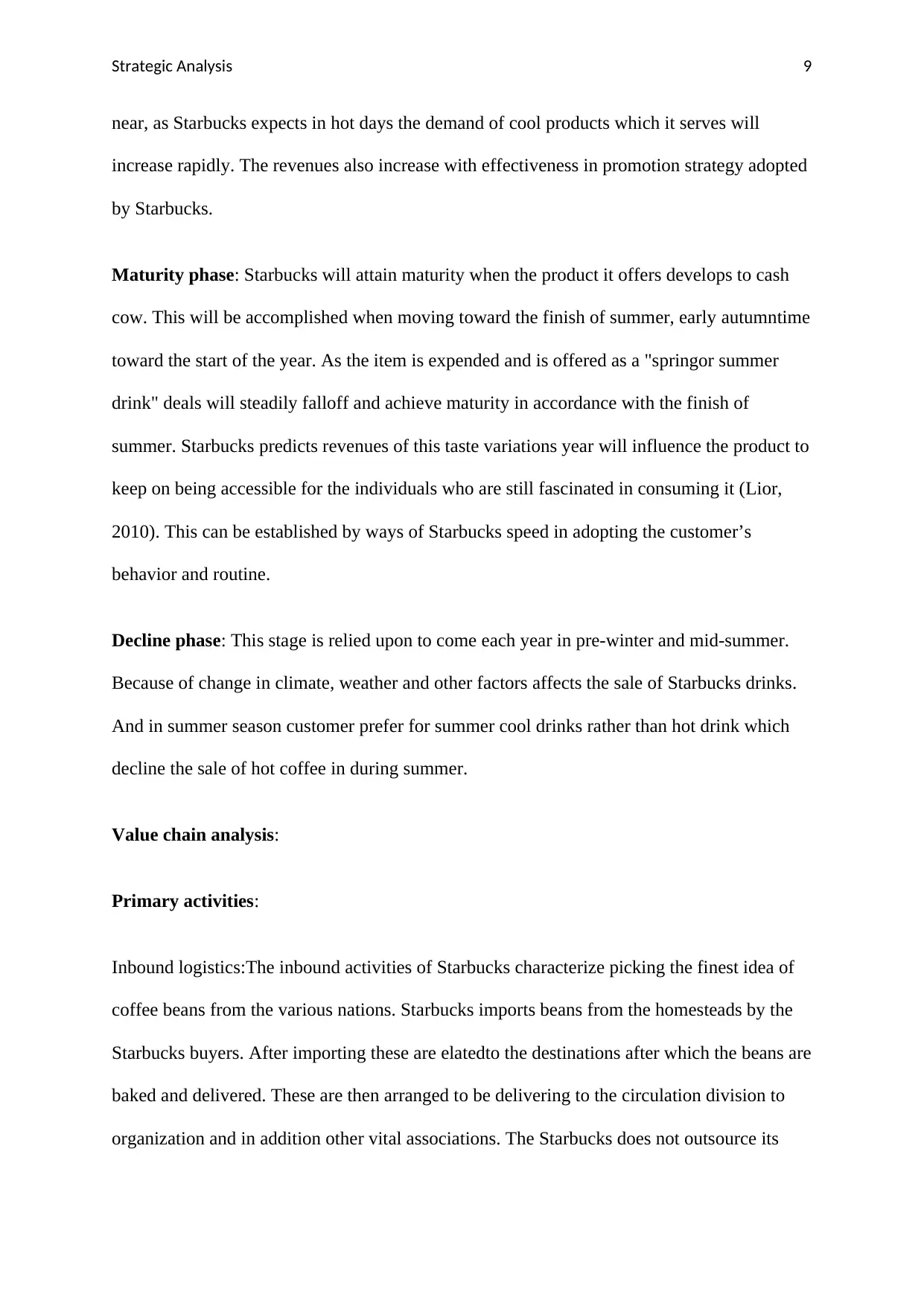
Strategic Analysis 9
near, as Starbucks expects in hot days the demand of cool products which it serves will
increase rapidly. The revenues also increase with effectiveness in promotion strategy adopted
by Starbucks.
Maturity phase: Starbucks will attain maturity when the product it offers develops to cash
cow. This will be accomplished when moving toward the finish of summer, early autumntime
toward the start of the year. As the item is expended and is offered as a "springor summer
drink" deals will steadily falloff and achieve maturity in accordance with the finish of
summer. Starbucks predicts revenues of this taste variations year will influence the product to
keep on being accessible for the individuals who are still fascinated in consuming it (Lior,
2010). This can be established by ways of Starbucks speed in adopting the customer’s
behavior and routine.
Decline phase: This stage is relied upon to come each year in pre-winter and mid-summer.
Because of change in climate, weather and other factors affects the sale of Starbucks drinks.
And in summer season customer prefer for summer cool drinks rather than hot drink which
decline the sale of hot coffee in during summer.
Value chain analysis:
Primary activities:
Inbound logistics:The inbound activities of Starbucks characterize picking the finest idea of
coffee beans from the various nations. Starbucks imports beans from the homesteads by the
Starbucks buyers. After importing these are elatedto the destinations after which the beans are
baked and delivered. These are then arranged to be delivering to the circulation division to
organization and in addition other vital associations. The Starbucks does not outsource its
near, as Starbucks expects in hot days the demand of cool products which it serves will
increase rapidly. The revenues also increase with effectiveness in promotion strategy adopted
by Starbucks.
Maturity phase: Starbucks will attain maturity when the product it offers develops to cash
cow. This will be accomplished when moving toward the finish of summer, early autumntime
toward the start of the year. As the item is expended and is offered as a "springor summer
drink" deals will steadily falloff and achieve maturity in accordance with the finish of
summer. Starbucks predicts revenues of this taste variations year will influence the product to
keep on being accessible for the individuals who are still fascinated in consuming it (Lior,
2010). This can be established by ways of Starbucks speed in adopting the customer’s
behavior and routine.
Decline phase: This stage is relied upon to come each year in pre-winter and mid-summer.
Because of change in climate, weather and other factors affects the sale of Starbucks drinks.
And in summer season customer prefer for summer cool drinks rather than hot drink which
decline the sale of hot coffee in during summer.
Value chain analysis:
Primary activities:
Inbound logistics:The inbound activities of Starbucks characterize picking the finest idea of
coffee beans from the various nations. Starbucks imports beans from the homesteads by the
Starbucks buyers. After importing these are elatedto the destinations after which the beans are
baked and delivered. These are then arranged to be delivering to the circulation division to
organization and in addition other vital associations. The Starbucks does not outsource its
Paraphrase This Document
Need a fresh take? Get an instant paraphrase of this document with our AI Paraphraser
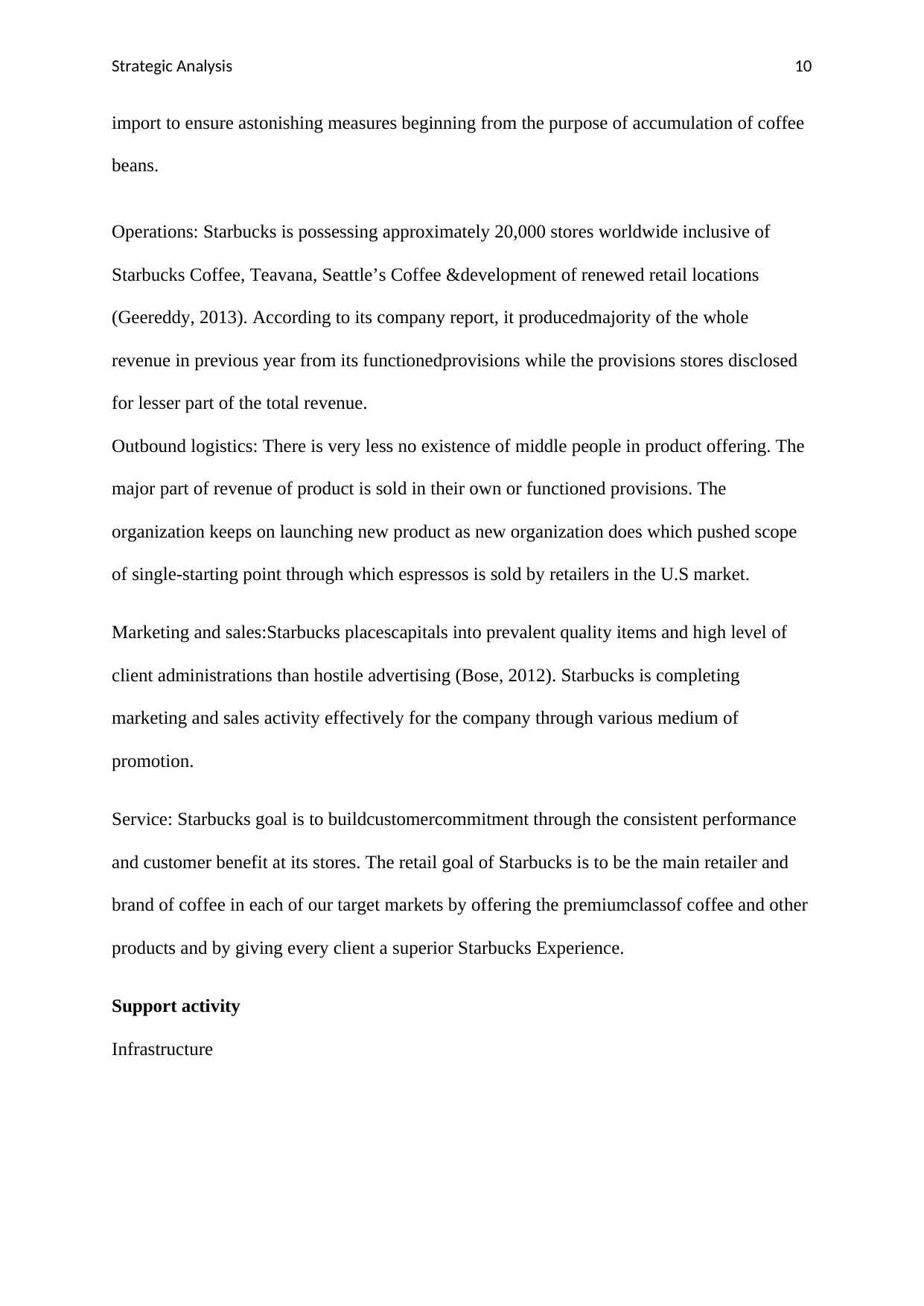
Strategic Analysis 10
import to ensure astonishing measures beginning from the purpose of accumulation of coffee
beans.
Operations: Starbucks is possessing approximately 20,000 stores worldwide inclusive of
Starbucks Coffee, Teavana, Seattle’s Coffee &development of renewed retail locations
(Geereddy, 2013). According to its company report, it producedmajority of the whole
revenue in previous year from its functionedprovisions while the provisions stores disclosed
for lesser part of the total revenue.
Outbound logistics: There is very less no existence of middle people in product offering. The
major part of revenue of product is sold in their own or functioned provisions. The
organization keeps on launching new product as new organization does which pushed scope
of single-starting point through which espressos is sold by retailers in the U.S market.
Marketing and sales:Starbucks placescapitals into prevalent quality items and high level of
client administrations than hostile advertising (Bose, 2012). Starbucks is completing
marketing and sales activity effectively for the company through various medium of
promotion.
Service: Starbucks goal is to buildcustomercommitment through the consistent performance
and customer benefit at its stores. The retail goal of Starbucks is to be the main retailer and
brand of coffee in each of our target markets by offering the premiumclassof coffee and other
products and by giving every client a superior Starbucks Experience.
Support activity
Infrastructure
import to ensure astonishing measures beginning from the purpose of accumulation of coffee
beans.
Operations: Starbucks is possessing approximately 20,000 stores worldwide inclusive of
Starbucks Coffee, Teavana, Seattle’s Coffee &development of renewed retail locations
(Geereddy, 2013). According to its company report, it producedmajority of the whole
revenue in previous year from its functionedprovisions while the provisions stores disclosed
for lesser part of the total revenue.
Outbound logistics: There is very less no existence of middle people in product offering. The
major part of revenue of product is sold in their own or functioned provisions. The
organization keeps on launching new product as new organization does which pushed scope
of single-starting point through which espressos is sold by retailers in the U.S market.
Marketing and sales:Starbucks placescapitals into prevalent quality items and high level of
client administrations than hostile advertising (Bose, 2012). Starbucks is completing
marketing and sales activity effectively for the company through various medium of
promotion.
Service: Starbucks goal is to buildcustomercommitment through the consistent performance
and customer benefit at its stores. The retail goal of Starbucks is to be the main retailer and
brand of coffee in each of our target markets by offering the premiumclassof coffee and other
products and by giving every client a superior Starbucks Experience.
Support activity
Infrastructure
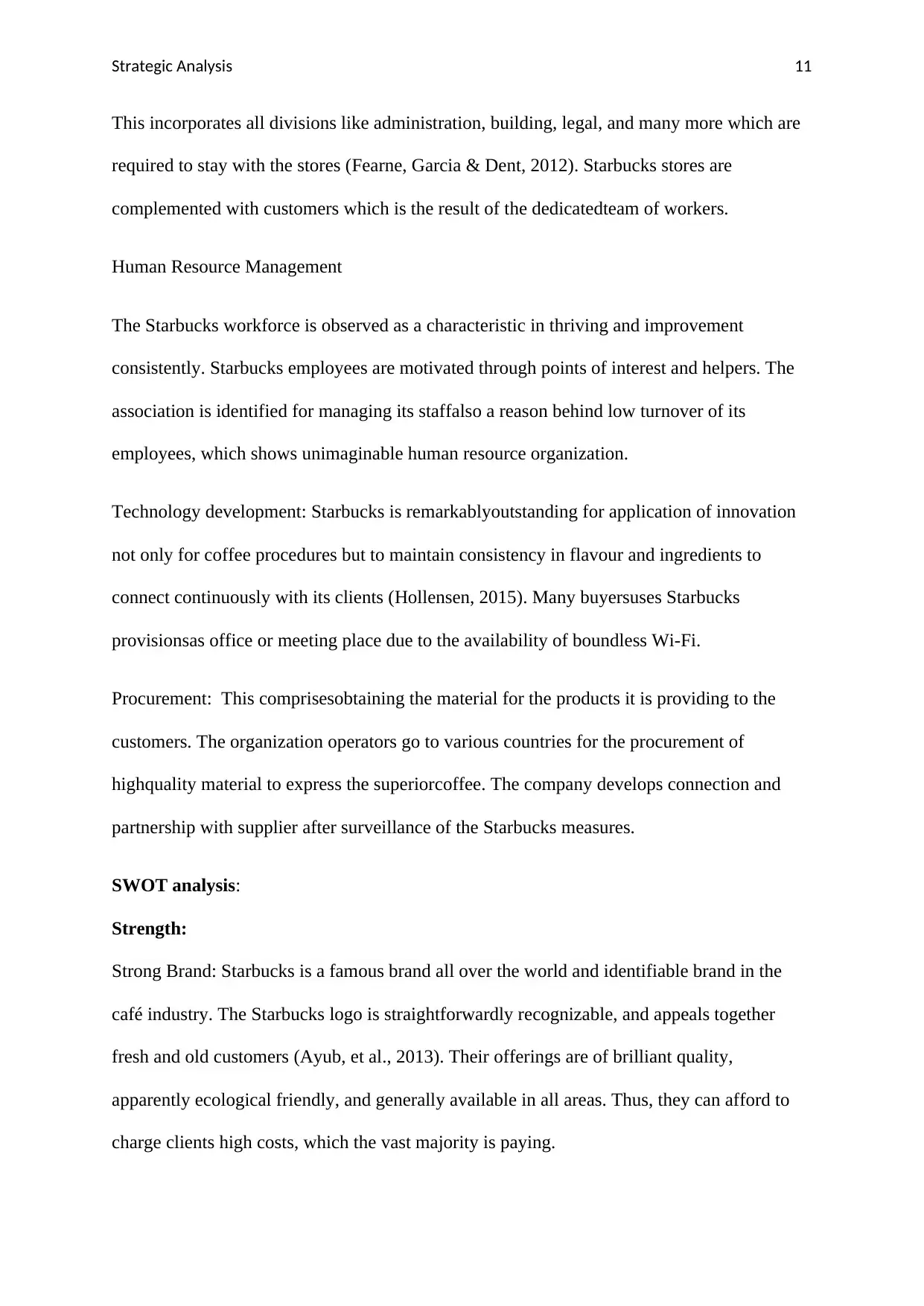
Strategic Analysis 11
This incorporates all divisions like administration, building, legal, and many more which are
required to stay with the stores (Fearne, Garcia & Dent, 2012). Starbucks stores are
complemented with customers which is the result of the dedicatedteam of workers.
Human Resource Management
The Starbucks workforce is observed as a characteristic in thriving and improvement
consistently. Starbucks employees are motivated through points of interest and helpers. The
association is identified for managing its staffalso a reason behind low turnover of its
employees, which shows unimaginable human resource organization.
Technology development: Starbucks is remarkablyoutstanding for application of innovation
not only for coffee procedures but to maintain consistency in flavour and ingredients to
connect continuously with its clients (Hollensen, 2015). Many buyersuses Starbucks
provisionsas office or meeting place due to the availability of boundless Wi-Fi.
Procurement: This comprisesobtaining the material for the products it is providing to the
customers. The organization operators go to various countries for the procurement of
highquality material to express the superiorcoffee. The company develops connection and
partnership with supplier after surveillance of the Starbucks measures.
SWOT analysis:
Strength:
Strong Brand: Starbucks is a famous brand all over the world and identifiable brand in the
café industry. The Starbucks logo is straightforwardly recognizable, and appeals together
fresh and old customers (Ayub, et al., 2013). Their offerings are of brilliant quality,
apparently ecological friendly, and generally available in all areas. Thus, they can afford to
charge clients high costs, which the vast majority is paying.
This incorporates all divisions like administration, building, legal, and many more which are
required to stay with the stores (Fearne, Garcia & Dent, 2012). Starbucks stores are
complemented with customers which is the result of the dedicatedteam of workers.
Human Resource Management
The Starbucks workforce is observed as a characteristic in thriving and improvement
consistently. Starbucks employees are motivated through points of interest and helpers. The
association is identified for managing its staffalso a reason behind low turnover of its
employees, which shows unimaginable human resource organization.
Technology development: Starbucks is remarkablyoutstanding for application of innovation
not only for coffee procedures but to maintain consistency in flavour and ingredients to
connect continuously with its clients (Hollensen, 2015). Many buyersuses Starbucks
provisionsas office or meeting place due to the availability of boundless Wi-Fi.
Procurement: This comprisesobtaining the material for the products it is providing to the
customers. The organization operators go to various countries for the procurement of
highquality material to express the superiorcoffee. The company develops connection and
partnership with supplier after surveillance of the Starbucks measures.
SWOT analysis:
Strength:
Strong Brand: Starbucks is a famous brand all over the world and identifiable brand in the
café industry. The Starbucks logo is straightforwardly recognizable, and appeals together
fresh and old customers (Ayub, et al., 2013). Their offerings are of brilliant quality,
apparently ecological friendly, and generally available in all areas. Thus, they can afford to
charge clients high costs, which the vast majority is paying.
⊘ This is a preview!⊘
Do you want full access?
Subscribe today to unlock all pages.

Trusted by 1+ million students worldwide
1 out of 22
Related Documents
Your All-in-One AI-Powered Toolkit for Academic Success.
+13062052269
info@desklib.com
Available 24*7 on WhatsApp / Email
![[object Object]](/_next/static/media/star-bottom.7253800d.svg)
Unlock your academic potential
Copyright © 2020–2026 A2Z Services. All Rights Reserved. Developed and managed by ZUCOL.




